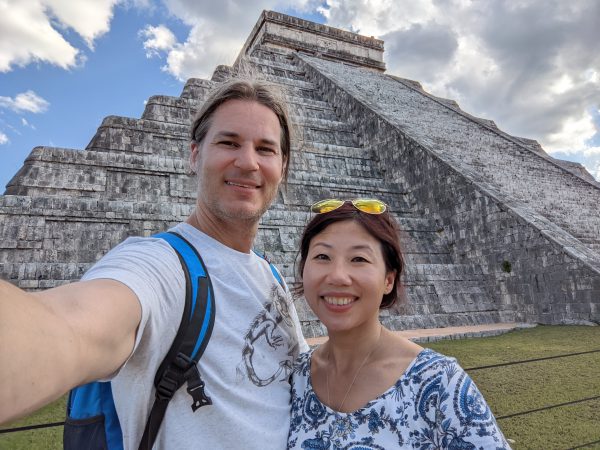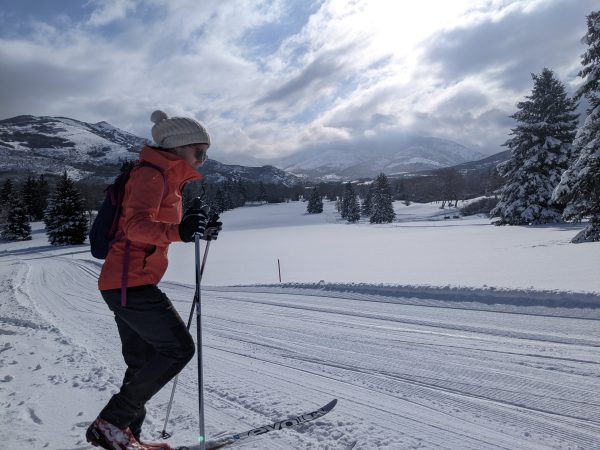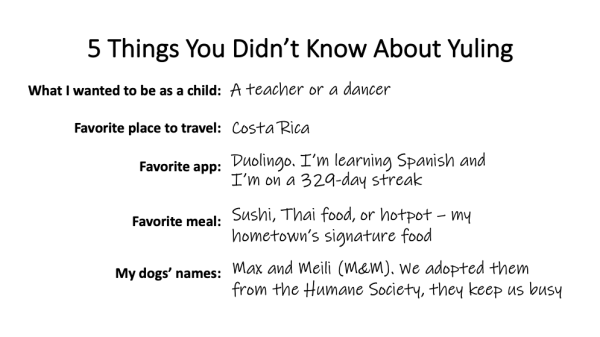“The vision is bold. But it’s realistic.”
Continuing our employee spotlight series, we spoke with Yuling Jiang, a Principal Clinical Terminologist Manager. Yuling started at Truveta in September of 2021.
How did you become interested in medicine?
My mom was a teacher, my dad was an electronic engineer. When I was young, I wanted to be a teacher, and then I went to a few summer camps for ballet, and I wanted to be a dancer. I was still debating when I went to college, and a family member said, “We don’t have a doctor in the family, you should be a doctor. And if you want to teach, you can teach medicine.” So, I went into preventive medicine.
What did you study at school?
I studied Preventative Medicine in Chongqing, I have an MD in China, but not in the US. It’s a five-year degree, including a hospital internship. My interests are more on the prevention side, and my second year after my degree, there was the SARS outbreak.
I got interested in data analysis, statistics, looking at data connections with epidemiology, patient tracing, and prevention. I wanted to get my graduate degree in the US, in Biology, because that’s fundamental. The lab test is the gold standard. Then, I heard about this wonderful biomedical informatics PhD program at the University of Utah and I wanted to use IT to help improve healthcare to make a bigger impact. I’m passionate about population health as preventative medicine. The 80/20 rule applies perfectly. 20% of resources can prevent 80% of diseases. That’s where I really immersed myself with data, electronic health records, clinical decision support, and now this is terminology we’re using daily.
Do you have a theory about why preventative care is difficult?
One reason is that behavior change is hard. Even if people have the knowledge that certain behaviors are bad for your health, implementing those into action is hard — it’s almost against human nature. There’s no lack of knowledge, there are different behavior change models. Books like The Power of Habit have the same idea: to make a big change, you have to get into a routine habit and reach the tipping point. That’s a hard thing to do. Another reason is: human nature is to only worry about the thing that’s happening right now. No one really wants to do that work until the big rock is in the middle of the road.
My first day of medical school in China, this very wise, 90-year-old forerunner of public health gave an opening speech. And he said, “You picked the wrong major, no one cares about preventative medicine.”
He said, picture a narrow mountain road, with a danger of sliding rock blocking the road, and you are the person in charge of preventing the rock from falling. If you do a good job, no one will know you did a good job, but if you didn’t do a good job, everyone will say, “Why is there this rock in the middle of the road?” They will spend time and money to remove the rock, but no one will spend the money to keep the rock out of the road. And that’s why anything preventative is hard.
What brought you to Truveta?
I worked in NLP (Natural Language Processing), extracting clinical concepts from clinicians and I was looking for a role where I could make a bigger impact in the clinical world. There was a lack of clinical data in my previous role. Nowhere else has this data and the potential. When I heard about Truveta, I thought, this is an amazing company and it fit in perfectly with my passion and my goals. I’m lucky I found this.
Previously, I worked as a data integration engineer at a healthcare analytics company and at a healthcare data company that did healthcare decision data. That was my first hands-on work after graduate school about how the clinical data world worked.
What does Truveta’s vision – saving lives with data – mean to you?
The vision is very bold. Professionally, I believe there’s way more impact and a lower cost to utilize the data to do preventative work. To access the lower hanging fruit to lower those barriers to get to behavior change. To discover that knowledge. The vision is bold. But it’s realistic.
Personally, I have questions about making medical choices. About five years ago, my husband discovered he has ASD, Atrial Septal Defect, there was a hole between two atria in his heart. In approximately .05% of babies, the atria in the heart don’t close. (According to the CDC, about “1 in every 1,859 babies born in the United States each year are born with Atrial Septal Defect.”) No doctor ever found anything, even after he complained about symptoms. He nearly collapsed when we were at the dog park and finally, a doctor did a special echo and found the problem. We were told he could collapse at any time. His heart was extremely enlarged because it had been trying to compensate. The data can help to identify, first, the condition, and second, the treatment. The surgeon gave us two options. As patients, we asked, what do you think? Is there enough data to say which option is better? He said, based on the data he had, he didn’t think there was any difference. But, there’s just not enough data. It was a huge decision, and we chose the less invasive option. My husband went through a five-hour open heart surgery, and he’s doing pretty well now.
Truveta can really be applied to every part of my personal life and my professional life. It all connects in so many ways.

Yuling and her husband.
How has the pandemic changed the way you work?
Before the pandemic, I was in the office every day, I was so used to the long commute in Seattle traffic. The pandemic changed that. I started at Truveta fully remote. It works great for me, I actually moved back to Utah where I went to graduate school and my husband spends most of his time. The demand of online meetings, being present in back-to-back meetings takes a lot of time, too. But Truveta supporting remote work is one of the reasons I joined.
What’s the most rewarding part of your job?
Seeing the dashboard showing results and knowing our work is directly contributing to that. The translation of our work to product right away, it’s amazing to see that. I’m lucky to have great people to work with and great mentorship from all over.
What do you like to do outside of the office?
I have lots of hobbies. I love dancing and I was on the university ballroom dancing team for five years during graduate school. These days, I do some adult ballet dancing on weekends to be in a totally different world. And we like the outdoors a lot, we go hiking, we started mountain biking recently. And cross-country skiing, the dry powder in Utah makes it one of the best places in the world for skiing.

Yuling cross-country skiing.

